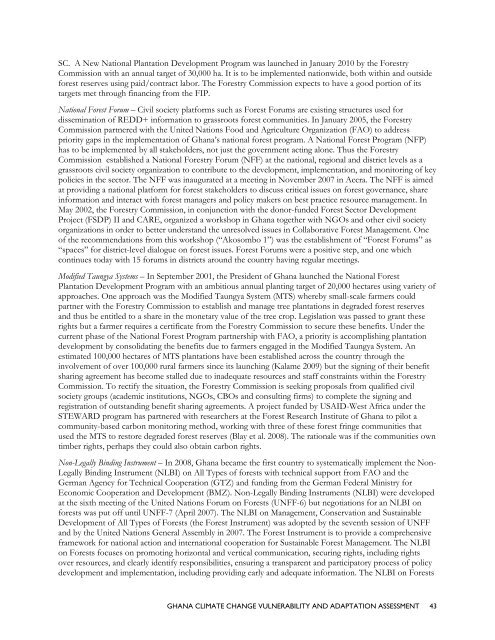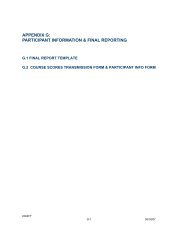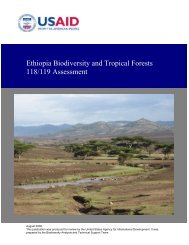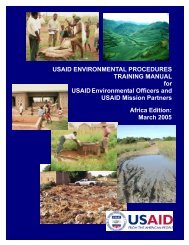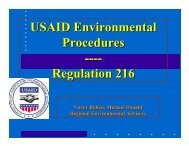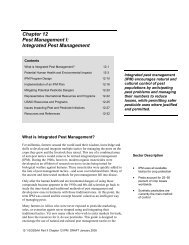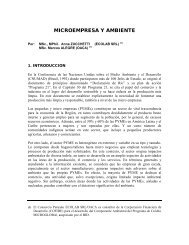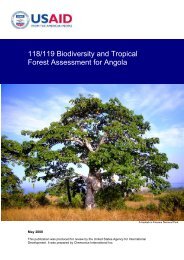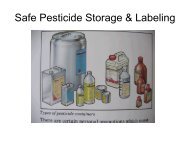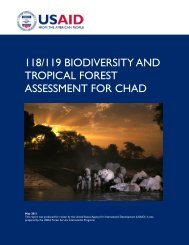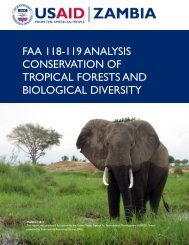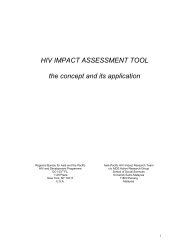ghana climate change vulnerability and adaptation assessment
ghana climate change vulnerability and adaptation assessment
ghana climate change vulnerability and adaptation assessment
- No tags were found...
Create successful ePaper yourself
Turn your PDF publications into a flip-book with our unique Google optimized e-Paper software.
SC. A New National Plantation Development Program was launched in January 2010 by the ForestryCommission with an annual target of 30,000 ha. It is to be implemented nationwide, both within <strong>and</strong> outsideforest reserves using paid/contract labor. The Forestry Commission expects to have a good portion of itstargets met through financing from the FIP.National Forest Forum – Civil society platforms such as Forest Forums are existing structures used fordissemination of REDD+ information to grassroots forest communities. In January 2005, the ForestryCommission partnered with the United Nations Food <strong>and</strong> Agriculture Organization (FAO) to addresspriority gaps in the implementation of Ghana’s national forest program. A National Forest Program (NFP)has to be implemented by all stakeholders, not just the government acting alone. Thus the ForestryCommission established a National Forestry Forum (NFF) at the national, regional <strong>and</strong> district levels as agrassroots civil society organization to contribute to the development, implementation, <strong>and</strong> monitoring of keypolicies in the sector. The NFF was inaugurated at a meeting in November 2007 in Accra. The NFF is aimedat providing a national platform for forest stakeholders to discuss critical issues on forest governance, shareinformation <strong>and</strong> interact with forest managers <strong>and</strong> policy makers on best practice resource management. InMay 2002, the Forestry Commission, in conjunction with the donor-funded Forest Sector DevelopmentProject (FSDP) II <strong>and</strong> CARE, organized a workshop in Ghana together with NGOs <strong>and</strong> other civil societyorganizations in order to better underst<strong>and</strong> the unresolved issues in Collaborative Forest Management. Oneof the recommendations from this workshop (“Akosombo 1”) was the establishment of “Forest Forums” as“spaces” for district-level dialogue on forest issues. Forest Forums were a positive step, <strong>and</strong> one whichcontinues today with 15 forums in districts around the country having regular meetings.Modified Taungya Systems – In September 2001, the President of Ghana launched the National ForestPlantation Development Program with an ambitious annual planting target of 20,000 hectares using variety ofapproaches. One approach was the Modified Taungya System (MTS) whereby small-scale farmers couldpartner with the Forestry Commission to establish <strong>and</strong> manage tree plantations in degraded forest reserves<strong>and</strong> thus be entitled to a share in the monetary value of the tree crop. Legislation was passed to grant theserights but a farmer requires a certificate from the Forestry Commission to secure these benefits. Under thecurrent phase of the National Forest Program partnership with FAO, a priority is accomplishing plantationdevelopment by consolidating the benefits due to farmers engaged in the Modified Taungya System. Anestimated 100,000 hectares of MTS plantations have been established across the country through theinvolvement of over 100,000 rural farmers since its launching (Kalame 2009) but the signing of their benefitsharing agreement has become stalled due to inadequate resources <strong>and</strong> staff constraints within the ForestryCommission. To rectify the situation, the Forestry Commission is seeking proposals from qualified civilsociety groups (academic institutions, NGOs, CBOs <strong>and</strong> consulting firms) to complete the signing <strong>and</strong>registration of outst<strong>and</strong>ing benefit sharing agreements. A project funded by USAID-West Africa under theSTEWARD program has partnered with researchers at the Forest Research Institute of Ghana to pilot acommunity-based carbon monitoring method, working with three of these forest fringe communities thatused the MTS to restore degraded forest reserves (Blay et al. 2008). The rationale was if the communities owntimber rights, perhaps they could also obtain carbon rights.Non-Legally Binding Instrument – In 2008, Ghana became the first country to systematically implement the Non-Legally Binding Instrument (NLBI) on All Types of forests with technical support from FAO <strong>and</strong> theGerman Agency for Technical Cooperation (GTZ) <strong>and</strong> funding from the German Federal Ministry forEconomic Cooperation <strong>and</strong> Development (BMZ). Non-Legally Binding Instruments (NLBI) were developedat the sixth meeting of the United Nations Forum on Forests (UNFF-6) but negotiations for an NLBI onforests was put off until UNFF-7 (April 2007). The NLBI on Management, Conservation <strong>and</strong> SustainableDevelopment of All Types of Forests (the Forest Instrument) was adopted by the seventh session of UNFF<strong>and</strong> by the United Nations General Assembly in 2007. The Forest Instrument is to provide a comprehensiveframework for national action <strong>and</strong> international cooperation for Sustainable Forest Management. The NLBIon Forests focuses on promoting horizontal <strong>and</strong> vertical communication, securing rights, including rightsover resources, <strong>and</strong> clearly identify responsibilities, ensuring a transparent <strong>and</strong> participatory process of policydevelopment <strong>and</strong> implementation, including providing early <strong>and</strong> adequate information. The NLBI on ForestsGHANA CLIMATE CHANGE VULNERABILITY AND ADAPTATION ASSESSMENT 43


